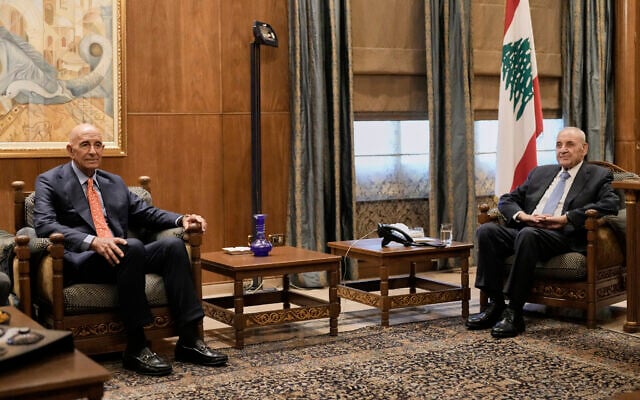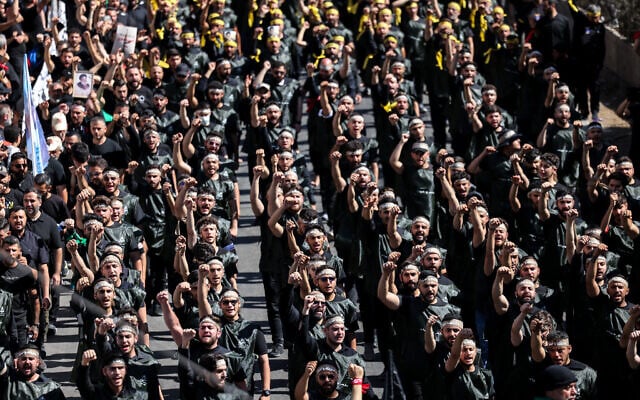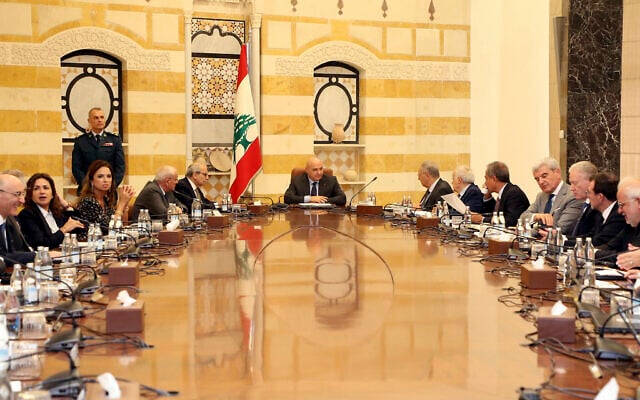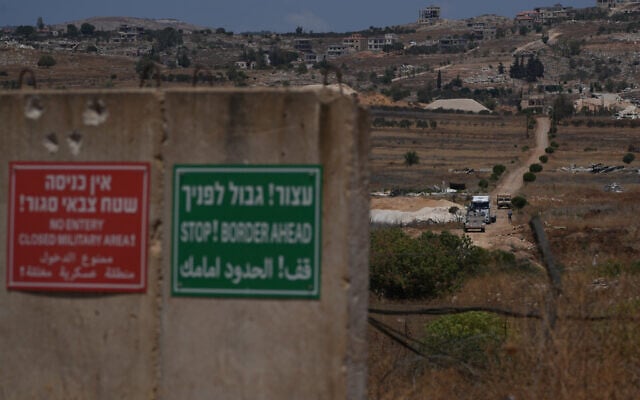The Lebanese government approved on Thursday the objectives of a US proposal that would ultimately lead to disarming the Hezbollah terror group.
Hezbollah ministers and Muslim Shi’ite allies walked out of the cabinet’s discussion on the plan, three Lebanese political sources told Reuters, days after the Iran-backed group lashed out at an earlier announcement of a plan to disarm Hezbollah, calling the move a “grave sin” and vowing to act “as if it did not exist.”
Lebanese Information Minister Paul Morcos said that the cabinet accepted the principles of the US proposal — including “the gradual end of the presence of non-state armed groups in the country, including Hezbollah, both north and south of the Litani River,” but said that the full details of the plan were not discussed in depth.
Morcos stated that the principles to which Lebanon agreed also include “ensuring Israel’s withdrawal from Lebanese territory and the cessation of all hostilities, including ground, aerial and maritime violations,” as well as the establishment of a permanent border between Israel and Lebanon and between Syria and Lebanon, and that all countries mentioned must commit to the agreement.
In a press conference following the cabinet meeting, Morcos was asked how Hezbollah’s disarmament would be carried out in light of the group’s refusal to cooperate. He responded that the decisions would be implemented in accordance with a plan to be submitted by the Lebanese Army by the end of August, which will include a timeline for disarmament by the end of 2025.
According to a copy of the Lebanese cabinet agenda reviewed by Reuters, the US proposal — submitted by US President Donald Trump’s envoy to the region, Tom Barrack — set out the most detailed steps yet for disarming the Iran-backed Hezbollah and for a full Israeli withdrawal from five key posts in south Lebanon.

US Ambassador to Turkey and Special Envoy to Syria Tom Barrack, left, meets with Lebanese Parliament Speaker Nabih Berri, in Beirut, Lebanon, July 22, 2025. (AP Photo/Hassan Ammar)
Barrack hailed on Thursday Beirut’s “historic” decision in approving the framework.
In a post on X, Barrack congratulated Lebanese leaders “for making the historic, bold, and correct decision this week to begin fully implementing” the ceasefire deal. “This week’s Cabinet resolutions finally put into motion the ‘One Nation, One Army’ solution for Lebanon. We stand behind the Lebanese people.”
Israel dealt major blows to Hezbollah in an offensive last year, the climax of a conflict that began on October 8, 2023, when the Lebanese group started firing rockets and drones at Israel on a daily basis, in support of its ally Hamas, which had invaded the Jewish state from Gaza a day earlier, killing some 1,200 people and taking 251 hostages.
The US’s disarmament proposal aims to “extend and stabilize” a ceasefire agreement between Lebanon and Israel brokered in November.
“The urgency of this proposal is underscored by the increasing number of complaints regarding Israeli violations of the current ceasefire, including airstrikes and cross-border operations, which risk triggering a collapse of the fragile status quo,” it said.
Phase 1 of the plan requires the Beirut government to issue a decree within 15 days committing to Hezbollah’s full disarmament by December 31, 2025. In this phase, Israel would also cease ground, air and sea military operations.
Phase 2 requires Lebanon to begin implementing the disarmament plan within 60 days, with the government approving “a detailed [Lebanese army] deployment plan to support the plan to bring all arms under the authority of the state.” This plan will specify disarmament targets.
During Phase 2, Israel would begin withdrawing from positions it holds in south Lebanon and Lebanese prisoners held by Israel would be released in coordination with the International Committee of the Red Cross (ICRC).

Lebanese Shiite Hezbollah supporters take part in a ceremony during the peak of Ashura, a 10-day period commemorating the seventh-century killing of Prophet Mohammed’s grandson Imam Hussein, in Beirut’s southern suburbs on July 6, 2025. (ANWAR AMRO / AFP)
During Phase 3, within 90 days, Israel will withdraw from the final two of the five points it holds, and funding will be secured to initiate rubble removal in Lebanon and infrastructure rehabilitation in preparation for reconstruction.
In Phase 4, within 120 days, Hezbollah’s remaining heavy weapons must be dismantled, including missiles and drones. Also in Phase 4, the United States, Saudi Arabia, France, Qatar and other friendly states will organize an economic conference to support the Lebanese economy and reconstruction and to “implement President Trump’s vision for the return of Lebanon as a prosperous and viable country.”
Hezbollah ministers, allies walk out of meeting in protest
Hezbollah ministers and Muslim Shi’ite allies in the Lebanese cabinet withdrew from the cabinet meeting on Thursday in protest of the plan, three Lebanese political sources told Reuters.
The meeting came after — amid US pressure and fears Israel could expand its strikes in Lebanon — Prime Minister Nawaf Salam said Tuesday that the government had tasked the army with developing a plan to restrict weapons to government forces by the end of 2025.
The decision was unprecedented since the end of Lebanon’s civil war more than three decades ago, when the country’s armed factions — with the exception of Hezbollah — agreed to surrender their weapons.

In this photo, released by the Lebanese Presidency press office, Lebanese president Joseph Aoun, centre, leads a Cabinet meeting which supposed to discuss the disarmament of Hezbollah, at the presidential palace in Baabda, east of Beirut, Lebanon, on August 7, 2025. (Lebanese Presidency press office via AP)
Hezbollah said on Wednesday that it would treat Beirut’s decision to disarm it “as if it did not exist,” accusing the cabinet of committing a “grave sin.”
It added that the move “undermines Lebanon’s sovereignty and gives Israel a free hand to tamper with its security, geography, politics and future existence.”
The Amal movement, Hezbollah’s main ally, headed by parliament speaker Nabih Berri, also criticized the move and called Thursday’s cabinet meeting “an opportunity for correction.”
Iran, Hezbollah’s military and financial backer, said on Wednesday that any decision on disarmament “will ultimately rest with Hezbollah itself.”
“We support it from afar, but we do not intervene in its decisions,” Foreign Minister Abbas Araghchi added, saying the group had “rebuilt itself” after the war with Israel.
Citing “political sources” with knowledge of the matter, pro-Hezbollah newspaper Al Akhbar said the group and its Amal allies could choose to withdraw their four ministers from the government or trigger a no-confidence vote in parliament by the Shiite bloc, which comprises 27 of Lebanon’s 128 lawmakers.
Israel — which routinely carries out air strikes in Lebanon despite the ceasefire, saying it is responding to violations of the agreement — has already signaled it would not hesitate to launch destructive military operations if Beirut failed to disarm the group.
Since the beginning of a ceasefire in November 2024, the IDF says it has carried out over 500 airstrikes against Hezbollah targets in Lebanon, killing at least 230 operatives and destroying dozens of sites belonging to the terror group, saying they violated the terms of the truce.
Under the ceasefire agreement, Israel is entitled to act against immediate threats posed by Hezbollah, but must forward complaints about longer-term threats to an oversight committee.
A Hezbollah operative was killed in an Israeli drone strike in Lebanon’s northeastern Beqaa Valley Tuesday night, and a further wave of strikes on Wednesday targeted weapons depots, rocket launchers, and sites used to store construction vehicles, according to the Israeli military. Israeli strikes killed two people on Wednesday, according to the Lebanese health ministry.
